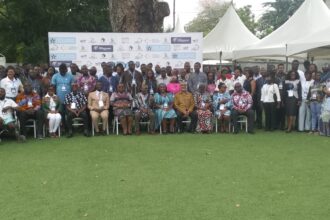In a determined effort to promote gender-inclusive governance and sustain women’s political engagement beyond electoral cycles, ABANTU for Development, a leading women’s rights advocacy organization in Ghana, has held a strategic engagement with non-elected women parliamentary candidates from the 2024 general elections.
With support from the African Women’s Development Fund (AWDF), the engagement formed part of a broader project titled “Strengthening Activism for a Gender-Responsive Elections 2024 in Ghana.” The initiative seeks to address the systemic underrepresentation of women in Ghanaian politics by building leadership solidarity and advancing inclusive democratic practices.
The gathering, held in Accra recently brought together women who b contested but did not win parliamentary seats in the 2024 elections, offering them a platform to reflect on their political journeys, share insights, and chart a course for continued activism.
The meeting was purposed to deliberate on the experiences and challenges faced by women candidates during the 2024 parliamentary elections, identify critical structural and institutional barriers that impede women’s political success and foster cross-party solidarity among women political leaders to unify efforts in advancing gender equality in governance.
ABANTU emphasized that political empowerment should not end with electoral defeat and that building resilient networks of women leaders is essential for long-term change.
Welcoming participants to the forum, the Executive Director of Abantu for Development Dr Rose Mensa-Kutin, emphasized the importance of recognizing women who contested elections regardless of the outcome, adding that, “anyone courageous enough to contest for elected office deserves recognition.
Dr Mensah Kutin noted that, “too often, attention is given only to winners, while those who do not win are forgotten. Yet, they too are leaders in their communities and vital to our democratic process.”
She revealed that out of 119 women who contested in the 2024 parliamentary elections, 78 did not win their seats.
She observed that although the Affirmative Action Law was passed in 2024, its late passage made full implementation impossible before the elections, hence the need for platforms that advance women’s political participation.
Former Minister of Gender, Children and Social Protection and ex-MP for Okaikwei South, man, commended the resilience of women candidates, describing their sacrifices as significant to both family and national life.
She urged women not to see electoral defeat as the end of their political journey. “Not winning is never the end. It can be a steppingstone to new opportunities in governance and party leadership,” she said.
She, however, expressed concern over persistent barriers, including gender-based political violence and inadequate financing, which continue to discourage women from contesting.
She called for the full enforcement of the Affirmative Action (Gender Equity) Act, 2024 (Act 1121), stressing that its 30% quota must be applied across all levels of governance.
The Former Member of Parliament for Awutu Senya East Hon Mavis Hawa Koomson also recounted her rise from constituency women’s organiser to Parliament in 2012 and her subsequent ministerial roles.
She attributed her 2024 defeat to political violence and intimidation, warning that such practices undermine democracy and discourage young women from entering politics.
She reaffirmed her commitment to leadership, expressing her ambition to become the National Women’s Organizer of her party.
On her part, the Municipal Chief Executive for Juaben Municipal Assembly in the Ashanti Region, Eunice Ohenewaa Ansu, also shared her story of defying discouragement to contest in a constituency considered an opposition stronghold.
Despite challenges such as lack of financial support and internal party divisions, she emerged as her party’s candidate. Though she lost in the general elections, she was later appointed MCE. She called on women to remain courageous, focused, and committed despite the difficulties.
In a presentation, Ms Becky Ahadzi, Coordinator of the Affirmative Action Law Coalition, also urged government, political parties, and civil society to ensure the full implementation of the Affirmative Action Gender Equity Act to boost women’s representation in governance.
Ms Ahadzi told participants that although the Act was passed in July 2024 and became law in September, it did not impact the 2024 elections but provides a framework to address gender gaps. The law sets targets of 30% female representation in public and private sectors by 2026, rising to 50% by 2034.
By: Mohammed Suleman/ Publicagenda.news














